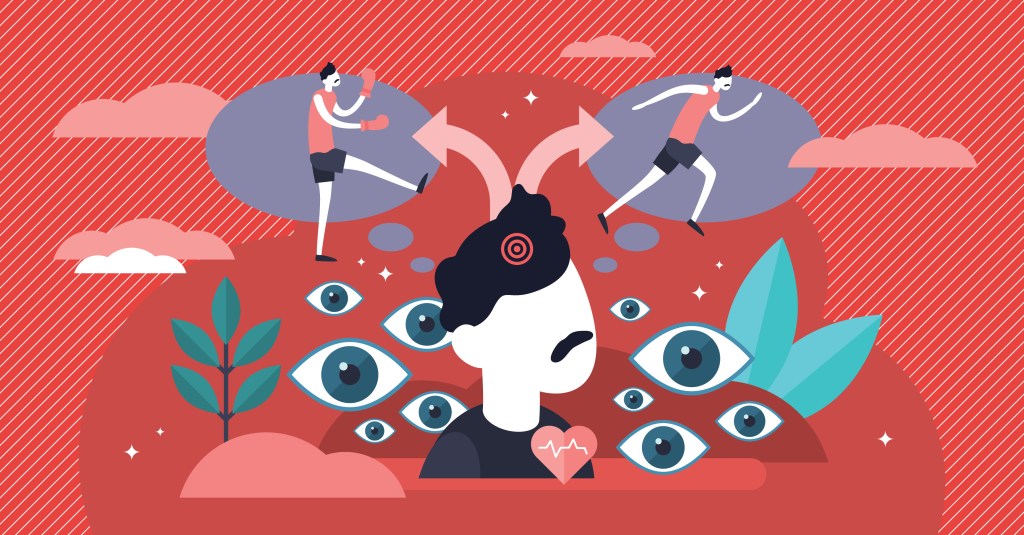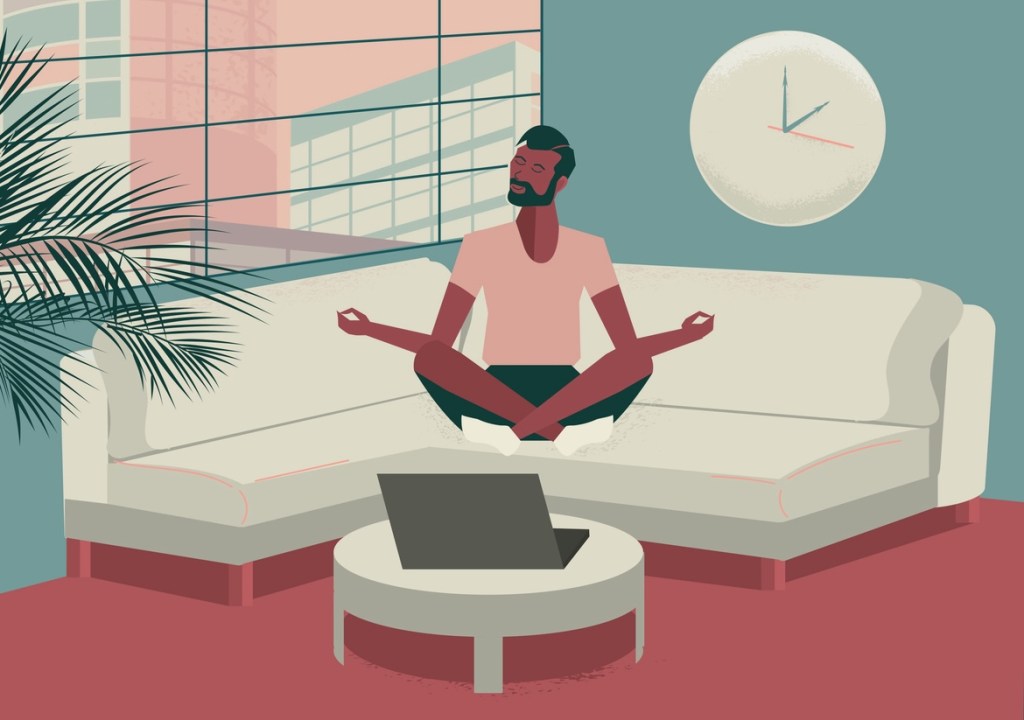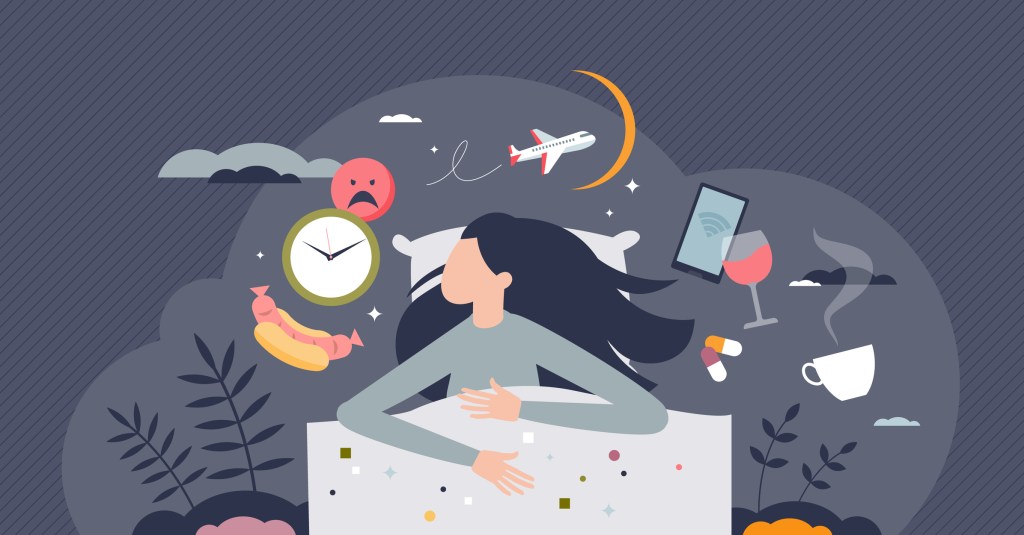It’s no secret that we live in stressful times. Whether you’re facing pressure at work, struggling at home, or worrying about one of the many issues facing society at large, you might be experiencing feelings of uneasiness, doom, or even panic. They can result in physiological changes in the form of muscle tension, sweating or shaking, or even heart palpitations and abdominal distress.
Dubbed the “fight-or-flight” response, this sense of heightened alertness and distress evolved as a survival mechanism, per Harvard Medical School’s Dr. Howard E. LeWine. It’s intended to activate you during times of immediate peril, like facing a dangerous animal or outrunning a fire, but it isn’t the best solution for dealing with a big work presentation or a dreaded dentist appointment. Still, the body tends to sound these biological alarm bells even during non-life-threatening situations.
“Many people are unable to find a way to put the brakes on stress,” LeWine writes. “Chronic low-level stress keeps the [brain] activated, much like a motor that is idling too high for too long. After a while, this has an effect on the body.”

It’s normal to feel anxiety or stress occasionally during unfamiliar situations, but if it becomes constant, overwhelming, and affects your ability to live your life, you may suffer from an anxiety disorder. If untreated, chronic anxiety can lead to long-term woes like high blood pressure, insomnia, clogged arteries, digestive issues, depression, and addiction.
According to the National Institutes of Health, around 19% of U.S. adults say they experience anxiety disorders each year, while 31% report having experienced such a disorder at some point in their lives. Anxiety disorders are the most common mental illness in the world, affecting an estimated 4% of the global population, per the World Health Organization. In other words, if you experience anxiety, hundreds of millions of people are in the same boat.
Luckily, there are science-backed ways to quell those feelings of dread — some of which you can do right now. Please note that, especially if you’re suffering from a diagnosed chronic anxiety disorder, none of these should replace consulting a professional mental health practitioner.
Eat Brain-Friendly Foods
It can be especially hard to fuel your body with nutritious foods when you’re dealing with anxiety, but experts say that certain things can exacerbate your worries, while others can help calm them.
According to the Mayo Clinic, complex carbohydrates found in whole grains may help calm your brain. Many proteins contain tryptophan, a crucial ingredient for serotonin — plus, they make you feel fuller for longer, providing a solid foundation for your daily mood.
From salmon to bananas and dark chocolate, check out Healthline’s list of more mood-boosting foods you can incorporate into your diet.
Get Moving

Harness the boost of energy you get from the fight-or-flight response and put it toward a productive form of physical activity. Exercise can boost your metabolism, release pleasant-feeling endorphins, and help take your mind off of whatever is worrying you.
“Exercise decreases sensitivity to the body’s reaction to anxiety,” clinician Katharina Star, who specializes in anxiety and panic disorder treatment, writes for Verywell Mind. Developing a regular exercise schedule helps you generate new connections in key areas of the brain, which may in turn help you better cope with negative feelings.
For adults, the U.S. Department of Health and Human Services recommends at least 150 minutes of moderate aerobic exercise — or 75 minutes of vigorous activity — each week. So, whenever you’re feeling anxious, try moving around or hitting the gym.
Take a Deep Breath (or Several)
You can do this one right now. Ready?
- Inhale slowly, deeply expanding your belly, to the count of four.
- Hold your breath to the count of four.
- Exhale slowly to the count of four, and repeat.
The same way you have a stress response, you have a relaxation response that brings you back down from that state of activation. Stress management expert Elizabeth Scott explains in an article for Verywell Mind that deep breathing can help stimulate this — when you slow the pace of your breath, you also slow your heart rate, lower your blood pressure, and stop releasing stress hormones like adrenaline and cortisol.
There are numerous ways to approach breathwork. To learn more, check out our guide here.
Meditate

The holistic benefits of having a regular meditation or mindfulness practice have been borne out by research. One study found mindfulness-based stress reduction, or MBSR, to be as effective a treatment as the anti-anxiety medication Lexapro.
“Meditation can help you learn to stay centered and keep inner peace,” the Mayo Clinic explains. “These benefits don’t end when your meditation session ends. Meditation can help take you more calmly through your day. And meditation may help you manage symptoms of some medical conditions.”
Developing a regular meditation practice could help you reset your mind and begin to alleviate your long-term anxiety symptoms within a few weeks, as evidenced by participants in a 2022 study. You can try several different mindfulness methods or use apps like Calm, Headspace, or Insight Timer to delve deeper into guided meditation.
RELATED: I Meditated Every Day for 8 Weeks — Here’s How It Went
Count to 3
In times when your anxiety feels particularly overwhelming, mental health professionals recommend using the 3-3-3 rule. Turn your senses outward and identify three things you can see, three things you can hear, and three things you can touch (or you can instead move three different parts of your body). The goal is to intentionally focus on all of these things as you identify them, taking the time to describe them to yourself.
“It’s basically a way of distracting yourself from your anxiety by shifting your attention to your senses,” Aimee Daramus, a clinical psychologist at Clarity Clinic, Chicago, told Verywell Mind. Taking yourself out of your head and into the external world can stop you from spiraling, ground you in the present, and even generate your body’s relaxation response.
Prioritize Sleep

According to the Sleep Foundation, anxiety can be both a cause and symptom of insomnia. The near-constant state of mental arousal may prevent you from falling asleep or disrupt your sleep pattern. This makes building healthy sleep habits crucial: Make your bedroom comfortable, dark, and free of digital distractions. Avoid caffeine and alcohol too close to bedtime, and implement sleep-friendly bedtime rituals like meditation, deep breaths, or reading a book.
Immerse Yourself in Nature
Calming your mind can be as simple as stepping outside into nature. One study of 20,000 people found that those who spend at least two hours in a green space each week (whether a city park or other natural environments) are significantly more likely to report good health and psychological well-being. As Nice News reported in 2022, even birdsong may be a balm for the brain.
“You can boost your mood just by walking in nature, even in urban nature,” Lisa Nisbet, a psychologist at Trent University in Canada, told the American Psychological Association. “And the sense of connection you have with the natural world seems to contribute to happiness even when you’re not physically immersed in nature.”
RELATED: Arts and Crafts May Support Well-Being Even More Than Having a Job: Study












